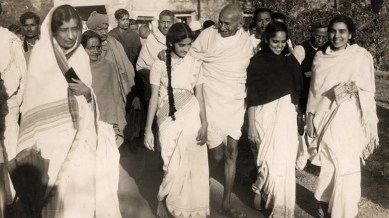Why Anand Patwardhan made his latest documentary: ‘A lot of our history is being wiped out today’
The award-winning documentary 'The World is Family' highlights the importance of conserving oral history, Hindu-Muslim unity and distortions of Gandhian ideology

Written by Deepak Rajeev
Anand Patwardhan was with his family visiting Pune’s Sahyadri School for a screening of his anti-nuclear film War and Peace (2002). During the discussion, a student asks him, “Why did Gandhiji divide India and Pakistan?” Anand replies with a question and a tender smile: “Who told you that?” He goes on to explain that at the time of the Independence Day celebrations in 1947, Gandhi was absent as he was deeply upset about Partition and the riots that followed. He was in Kolkata to quell the communal violence between Hindus and Muslims. This question by the child was one of the main reasons why Anand made his recent documentary, The World is Family (Vasudhaiva Kutumbakam, 2023).
monthly limit of free stories.
with an Express account.
The 96-minute film, which maps the filmmaker’s family history and of the nation, was recently screened at Jawahar Bhavan, New Delhi, organised by the Kriti Film Club. It won Best Feature Documentary award at New York Indian Film Festival and International Documentary and Short Film Festival of Kerala last year. The film was screened on August 17 at Kerala Lalithakala Akademi, Thrissur, as part of the ‘ You I could not Save, Walk with Me – Freedom, Gandhi, 169 Days’ exhibition, organised by Samadarshi and Democratic Secular Collective.
Anand says capturing moments together as a family is not unusual, but he realized during the Covid lockdown that reams of this footage deserved to be seen by others too. “Initially, it was just a home movie, just for the family. But, at some point, while looking at the footage I realised that there is material in here which the whole country should see. Today, a lot of our history is being rewritten; people are being taught a false history. Therefore, it was important to have a first-person-narrative from the people who actually witnessed the Independence movement,” says Anand.
Anand’s father, with a smile says, “I am the only one (in the family) who never went to jail” while his mother who holds his hand chides him: “You behave yourself”. They are the central characters in this film. It depicts their playful moments of anger, love, celebrations, nostalgic reminiscences and even death. In the beginning, Anand’s voice-over tells that “Mummy had made papa promise not to die before her,” and by the end we see that he kept his promise. Shot over a span of more than 30 years, the film is as much a personal documentation as it is a political recollection.
For someone who has been documenting social fault lines for over five decades, Anand’s political and civil rights-oriented documentaries have won numerous national and international awards. At the Delhi event, the 75-year-old filmmaker said: “Indian independence was won by the socialists, the secularists and the democrats. In fact, the communal forces, whether it was the Hindutva of the time, RSS, Hindu Maha Sabha or the Muslim League, were actually collaborating with the British; they were not fighting for independence. Yet today, they call themselves nationalists.”
In The World is Family, we see Anand visiting Pakistan as part of the people-to-people peace movement in 2003. The Sindh province was once his mother’s home. Anita Ghulam Ali, whose family lived close to Anand’s before the Partition in 1947
, remembers an instance of Hindu-Muslim brotherhood. “The facts are that his (Anand’s) grandfather and my grandfather and his grandfather’s brother, were all fed by my great grandmother. So, they always considered themselves brothers. If she divided anything, it would always be divided among these three. As strange as it may sound today, they were Hindus and we were Muslims. Nobody seemed to mention it. Nobody even seemed to think about it,” she says in the documentary.
During the post-screening discussion, Anand also spoke of Mahatma Gandhi. “I talk a lot about Gandhi because of the distortions that have happened to him in today’s India and world. Although he started out as a conservative in terms of caste, he kept on improving himself, learning from his mistakes. By the end of his life, Gandhiji became a true radical and advocated inter-caste marriages and wouldn’t even go to a wedding if it is not inter-caste. Actually he was killed because he tried to destroy caste,” says Anand.
Deepak Rajeev is an intern with The Indian Express